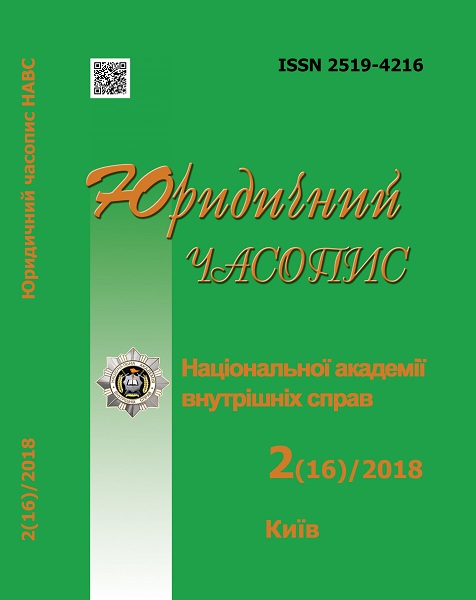The Bioethical Principles as the Approval of a New Level of Human Rights Protection in International Law
Abstract
Scientific research and medical manipulations on human being became widespread with the development of medicine, biology and genetics in the XX century. This has created necessety to protect life, health and dignity of a human being, and consolidate the universal rules of interference with human body on the international level. For this purpose, bioethical principles play special role in establishment and protection of human rights as guidelines for ethical requirements in case of biomedical achievements application to human being. In general, bioethical principles define the limits of permissible interference in human nature, and also establish a prohibition or restriction of any activity that may endanger the life, health and dignity of a person. Realization of bioethical principles at the national legal systems’ level has differences. However, activities of international organizations on protection of human rights in the field of bioethics aims at developing and promoting the implementation of universal principles, that are necessary for prevention of human rights violations at the level of international law. The field of bioethics includes complex issues of law and morals, which are reflected in numerous international declarations, conventions, resolutions and recommendations at the universal and regional level of international law. The UN and its specialized agencies, as well as the World Medical Association, play the important role in the development of bioethical principles for protection of human rights, as well as the Council of Europe and the European Union at the regional European level. All bioethical principles are in close interaction with each other, since they are aimed at protecting human life, health and dignity. The basic bioethical principles include: the principle of prohibition of discrimination (non-discrimination), voluntary informed consent of a person (for scientific researches and medical interventions) and confidentiality, prohibition of financial gain regarding using the human body and its parts, comparison of benefits over harm, primacy of human being, personal autonomy, integrity of a person and others. The emergence of problems relating to complex issues of conception (artificial reproductive technologies), extension (transplantation), reproduction (cloning) and termination (abortion, euthanasia) of human life have led to the need of developing of the universal ethical standards in the field of biomedicine and fixing them at the level of international law. In the international human rights law the protection of human right to life plays an important role, that in its broad meaning includes respect for human dignity, freedom from torture and discrimination, respect for private life. At the same time, these bioethical principles give rise to corresponding rights, in particular such as: the right to personal autonomy, freedom from biomedical interventions without voluntary informed consent, right to integrity of the person, right to equality and non-discrimination, and others. In general, the application of bioethical principles in the international law for regulation of the important and complex ethical issues, related to innovative biomedical technologies, promotes the unification of the international legal approach to the problem of the protection of human rights, life and health in conditions of scientific and technological progress in biomedicine. The principles of bioethics, related to the biomedical activity regulation, have significant influence on the establishment and protection of human rights in the international law, as they serve for prevention of possible violations of morality, as well as irreversible changes in the human genome and negative consequences for both an individual and mankind in general, and also help to form a responsible attitude to life of future generations.
Downloads
Abstract views: 431 PDF Downloads: 239
Copyright (c) 2019 Law Magazine of the National Academy of Internal Affairs

This work is licensed under a Creative Commons Attribution-NonCommercial-NoDerivatives 4.0 International License.
- Authors reserve the right to authorship of their own work and transfer to the magazine the right of the first publication of this work under the terms of the Creative Commons Attribution License, which allows other persons to freely distribute published work with mandatory reference to authors of the original work and the first publication of an article in this magazine.
- Authors have the right to enter into separate additional agreements on non-exclusive dissemination of the work in the form in which it was published in the journal (for example, to post an article in the institution's repository or to publish as part of a monograph), provided that the link to the first publication of the work in this journal is maintained.
- The journal's policy allows and encourages the posting of articles by authors on the Internet (for example, in electronic storehouses of institutions or on personal websites), both before the submission of this manuscript to the editorial office and during its editorial processing, as this contributes to the creation of a productive scientific discussion and positively affects the efficiency and dynamics of citing the published work.




